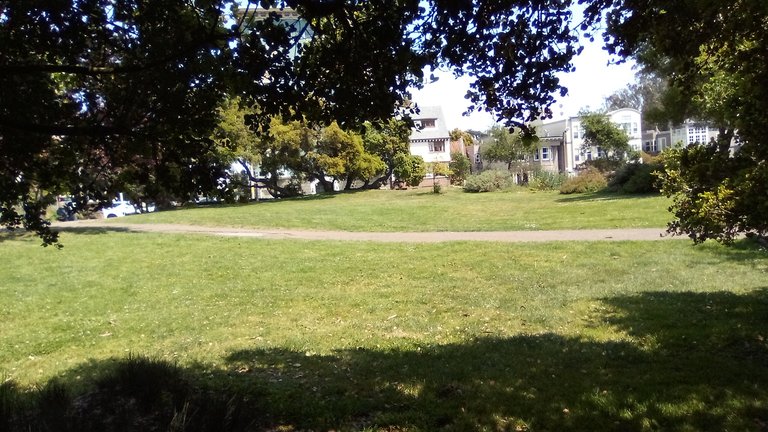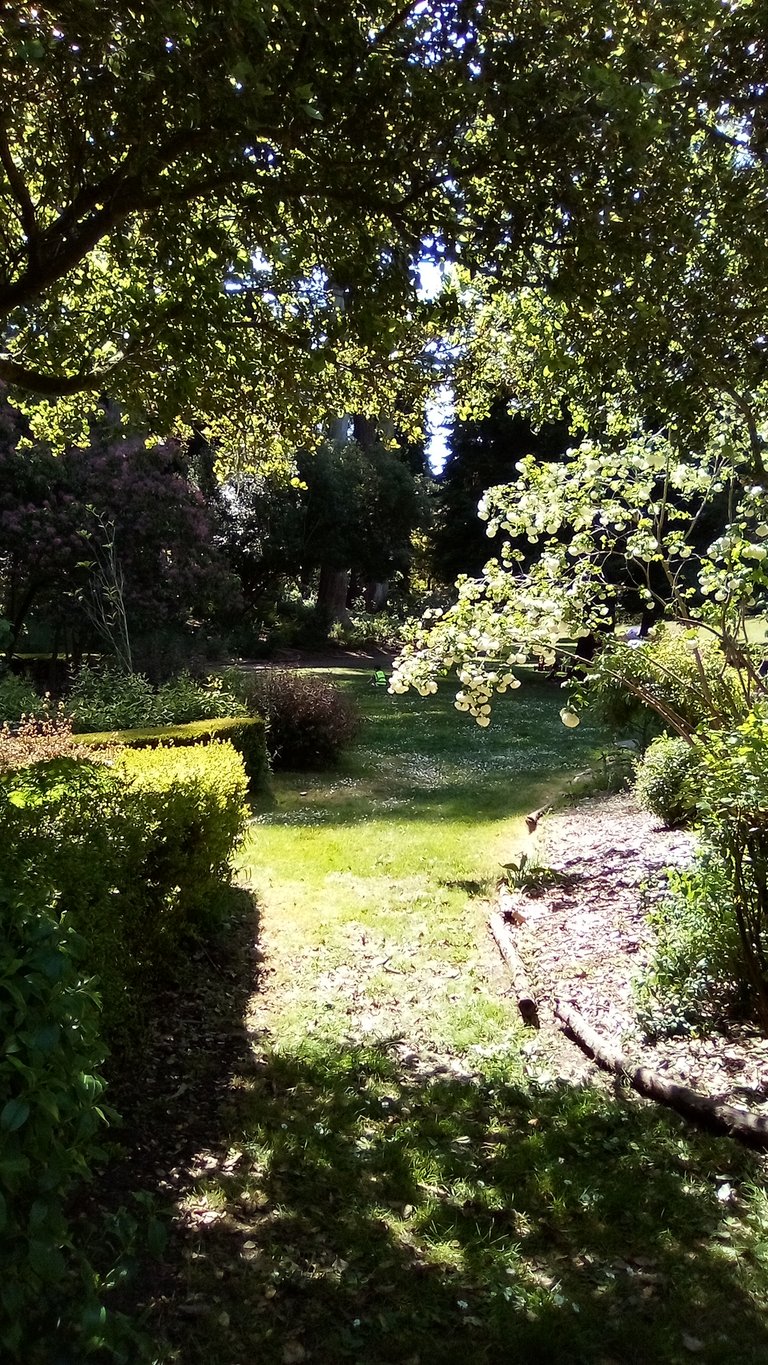"The Eisenblumenkinding," Week 2: A Dream Visit to King Marke in Cornwall (Schubert, Brahms, Bach, Löwe, Crosby, Stills, Nash, Young, Schumann, Mahler)

So, last week in non-fiction time but in the same afternoon in Q-Inspired time, I opted not to be walked home by the Ghost of Musical Greatness Past but rest in the meadow to which we had walked. He agreed without complaint, and then laughed gently ...
"I know that on the non-fiction side of the fourth wall, you were headed down to Alvord Lake but then again, you have never yet seen a side trail you didn't like ...

"I mean, someone walked off of it in front of me ... I didn't even know it was there, and I've passed this way for years!"
"Well, perhaps a portal has been opened for you ... perhaps your beloved King Marke, still living on in Q-Inspired's version of Cornwall long after the close of Wagner's Tristan und Isolde, has some wisdom for you in this stage of your life."
He paused, and then grinned.
"I shall see if I can pull Martti Talvela out of the heavenly choir rehearsal so he can be Marke ... ."
"Don't you dare!" I cried, and he laughed.
"I'm just teasing you, Frau Mathews -- since you prefer me as Marke, I will go up to costuming on high and of course prepare myself, and I will bring you all such things as you need to reprise your role as Sheba the Wise, Queen of Ethiopia on a visit."
"I can't even believe you suggested it -- don't get me wrong -- I love Mr. Talvela singing Marke's lament, but you know there is none other but you that I would have here!"
"I cannot get you to expand your horizons, Frau Mathews? You are so stubborn, mein Eisenblumenkind, but then, a long walk alone requires strong shoes with iron heels. I said to you that we would begin this week's lesson here:
And for what do you think you have been brought to this place in your life -- for what have you been called to this long climb away from people who would not even begin to think of how to invest their lives into who they are called to be?
"I had intended to go in a different direction with this lesson, but it occurred to me that your extension on King Marke already has partially covered this... you left him having picked seven younger counselors who are co-ruling with him, and him having brought Cornwall into great prosperity and the region into peace. He also looked out for Isolde's younger sisters and the entire region to make sure nothing like what happened to him, Tristan, and Isolde can ever happen again.
"Marke the Peacemaker may not be happier than Wagner's original character, but you thought he deserved a better outcome and you gave it to him. He walks on alone, in greater power. That bears further examination!"
"Well, the backstory I gave him partially explains the how," I said, "but yes, there is more to be considered there."
"So, we will ... rest here a while with me, and I shall meet you as the King Marke of your dreams ... I will sing you to sleep and drop you a hint of what you will discover ... not the songs I had in mind for you last week, but you will like this favorite of yours well enough."
Schubert's "Der Einsame" hit differently at this phase of my life, understanding my own journey again away from all the people I was leaving behind ... of days spent largely in my own company and that of my Creator in Creation ... of time taking account of the good and bad and letting the bad go while moving forward in more good ... of the songs of birds, if not the crickets, letting me know I was not entirely alone ... this brought me a new level of encouragement and comfort... and of course, that second reprise put me right to sleep ... such sweet caressing beauty in the voice of my favorite bass ...
(The timestamp is 12:12)
... and woke up in the royal gardens in Cornwall, in springtime ... quite reminiscent of the Fuchsia Dell, but from a different approach angle ...

... with my royal retinue from Ethiopia all around, enjoying themselves as they made sure I was safe and supplied. All around, the servants of King Marke appeared to be setting up a large garden party, and in the low hills above...

... my royal host had an unobtrusive rotating guard looking out for us.
"Good afternoon, Your Majesty," said a voice behind me, and there was my loyal court historian. "Much has transpired since we have last been in Cornwall; I will brief you now before King Marke meets us here."
Indeed much had happened, but in the line King Marke had been working toward during my last visit. He had adopted three of the six counselors -- Lords Joseph, Daniel, and Eli -- with whom he was co-ruling Cornwall upon my last visit, and had brought their elder children as observers into the council of seven as well, thus securing the succession to the second generation!
"This has not entirely been liked by even some of the allied nations on the Isles," my historian said, "for there is a concern that this will give nobles the idea that they can reign as well as a king, but the idea has led to such increased prosperity and peace for Cornwall that it is being imitated nonetheless."
The alliance of 20 nations King Marke had built was now 21 nations, for Breton, led by "The Iron Widow," Queen Boudakka, had joined because Cornwall and the allied nations had come to her aid by land and sea to fight off bands of Northmen who had thought to take advantage of her husband's death. Boudakka and her archers were fearsome warriors, and they were successfully defending their coast, but what the alliance had done was make sure those Northmen would never come back, following them back home and cutting them down to the ground.
This had established that Marke the Peacemaker had not lost the skills by which he had conquered Cornwall ... and also destroyed the idea that it had been Tristan who had accomplished all that. He had given Tristan all that credit in his lament, and he was giving all his princes and lords and knights and admirals the credit ... but that is just what great leaders do.
"Of course, Eire is still the unhappiest member of the alliance, Your Majesty," my historian continued, "and King Sean continues to scorch himself in his burning for revenge. He turned their anger on Lady Brangaene after King Marke stopped his plans to spread his daughters and his queen's potions across the alliance and wrest control of it, but when Lady Brangaene had to flee for her life, Glamis, the Scottish clan on the coast, let it be known that she would just be returning home.
"Queen Boudakka of the Bretons takes special care to know who the woman royals are around the coasts, and it so happens that 40 years ago, Eire defeated Glamis and took several of the clan chiefs' family members as captives. One was a widowed daughter who was pregnant and died in childbirth, but Boudakka knew the child survived and was a girl. She knew Lady Brangaene's grandmother, and instantly recognized the resemblance when Lady Brangaene escaped to her. Half the children of the chiefs of Glamis have a birthmark that easily denotes them as members of the clan; Lady Brangaene has that mark and is 40 years old. She is Glamis's missing princess, and Boudakka sent her home to Glamis in style!
"Obviously, King Sean was furious with Queen Boudakka. His father had defeated Glamis and made of a baby princess a royal servant; it was never supposed to be known that Lady Brangaene is the same rank as his own children, and Glamis, in its independence, was never supposed to get its princess back and flaunt that in his face. But King Sean could not attack another member of the alliance, so he began to threaten Glamis, only to have King Marke suggest to the other members that to secure the coasts from other Northmen threats, Glamis should be invited to join the alliance! The details are being worked out at this present hour."
I chuckled.
"King Sean doubtless regrets the day he thought to poison King Marke through his daughter Isolde, every day," I said.
"Doubtless, Your Majesty," my historian said. "The two kings were at the celebration with Queen Boudakka, dividing the Northmen's spoil, and while she was cordial in her interactions with King Sean, she assigned him the lowest place of the kings, while King Marke sat at her right hand while she sat at the left of the late King Beltran's chair with its iron garland still on it. He became so ill that Queen Iseualt had to use a potion to save him, some weeks later."
"Well, at least she is getting some good use out of her arts," I said.
"Indeed, Your Majesty," my historian said. "That is all the news, except that there are two letters, one from King Marke, one from Lord Joseph, that we embarked from Gibraltar and just missed that were returned here in anticipation of our arrival."

I read Prince Joseph's letter first, and was delighted to discover that he and I had developed a rich correspondence of our own. He had lost his mother and had rushed back to the king's service before completing his mourning because of all that happened with Tristan and Isolde. He had received a new royal father ... and that royal father had sought for him a royal mother and found that mother in me.
This also left room for Prince Joseph to express a deepening concern for King Marke that he could not express in the court because of the need to keep up a united strong front. He was careful even in his letters, but this was telling: "I have written to you that King Marke's latter victories remind me of my studies in the latter years of King David of old, but of late he has attained to even the wisdom and far-seeing perspective of Enoch, who walked with God daily."
The latter years of King David have their victories, but they come after the betrayal and death and Absalom his son, and although Israel would recover and thrive into the reign of Solomon, King David himself would never fully recover. To go from there to Enoch, who indeed walked with God, "and he was not, for the Lord took him," was Prince Joseph's way of saying to another student of Scripture that King Marke to his opinion was dying of grief like a man dies of walking pneumonia, slowly and then all at once, for like David, King Marke's grief over Tristan and Isolde's betrayal was unrecoverable.
With that in mind, I read King Marke's letter. We too had kept up our warm correspondence, and with Prince Joseph's veiled but definite alert in mind, I read it. He still held his peace. He still did not complain. He still looked at what he might do for the good of Cornwall, and poured his heart into that. There was a difference, however: with Breton added and Glamis considering joining the alliance, and with two generations of successors assured, the king's work to secure the prosperity of Cornwall and its allies as far into the future as his present influence could assure was nearly complete. His 55th birthday was at hand, and I did notice how he spoke of it ... it reminded me of the first part of a song that Prince Joseph would not have wanted heard sung ... for the king wrote that 'indeed I have redeemed the time, but the day has been long and hot, and I am tired ... I shall welcome the coming of the cool night, and its rest."
(The timestamp is 22:45, the very last song)
"Death is the cool night; life is the sweltering day" -- to a man who had lost three children by miscarriage, two queens, and a nephew loved as a son, and still walked on, indeed that might appeal after 55 years, an extraordinary lifespan for the 12th century.
Distantly I heard the horns. King Marke and his retinue were on approach, and soon arrived. Again, casting and costuming for the 12th century had to take the Ghost of Musical Greatness Past at six feet two and make of him a royal giant -- immense, broad-shouldered, imposing to a world of the 12th-century's European average height in a way we cannot fully appreciate today Gone was the black winter sable cloak of his mourning that he had been wearing at our last meeting; he contented himself to display the wealth of Cornwall in a robe of wool brocade in royal blue with some sapphires woven in ... but not too many, like the sea calmly sparkling on a clear, warm day. The occasional white-capped wave was represented by his full head and beard of white hair.
The king was in excellent condition, leaving no doubt that he could handle his iron scepter and his mighty glaive equally well as he had shown for, as he had shown for Breton. But all was peace and joy as he smiled and greeted me in character as Sheba the Wise, and thanked me for remembering his upcoming 55th birthday and making a visit.

Of course there were all the royal formalities, exchanging of gifts, a good royal feast ... and I noted both the king's quiet but immense joy in seeing me and the relief of Princes Joseph, Daniel, and Eli who came in turn from their royal duties to check on things as the afternoon went on.

Other people with less wholesome intents came to gawk as well; I drew the eyes as ever, being a Black Christian queen visiting a Europe terrified of Muslim Moors, and also coming at a time in which it was hoped that the Iron Widow Boudakka, queen of Breton, would become the king's third wife.
Drama galore ... but in the king's presence, there was none. I was careful not to eat too much, and was seated in a nice breeze, for the voice of the king could easily put one right to sleep in pleasant conversation. But in fact, he himself was tired, and was contented to rest there in that lovely place and time, so I did as well, in sight of him smiling as he himself closed his eyes. Whatever his grief still might have been, it was not lying so heavily upon him as it had been at its last meeting, at least not at this moment.

King Marke had not gone down to his summer palace, so we were in one of his castle gardens, and it was just a little way to my rooms there when a chill breeze at last heralded the coming of the close of the day. There I found fine wool breeches and jacket, and leather boots with iron heel -- apparently, some walking was planned for me in the future. But my walking partner was not content to wait. The king was pacing the castle grounds that night, unable to sleep, his own heels periodically striking a harder place and thus indicating a complete circuit.
I put on my robe and added the boots, but never made it past the open door, for my ears alerted me to other people, up in the night.
"The timing could not be worse. We need him to commit to Breton or Glamis, but here again is this benighted Sheba."
"Which may be an advantage -- the Iron Widow could use a little humbling, and also, if the rumors are true about what Eire plans, a third target will confuse them."
"Good point. So far our king has proven himself a much more shrewd operator, and it does not hurt that King Sean is drinking a bit more and talking too much. However, our king has one weakness, and Eire knows what it is. It is dangerous thing to be a man who loves so hard, and be a king."
"If Eire could just get clear on who its real enemy is, but that is asking for too much in these times. King Marke not only has made Cornwall richer, but Eire too, and has been exceptionally kind since they share now a common grief. I just don't understand how people let themselves not understand."
"It's because Marke isn't royal-born, and has not walked the acceptable path at any time as king. He's the fifth-born son of a minor lord who was supposed to be a monk, but came back from Jerusalem and was ordered to marry -- and then did so, and his wife could not bring a child to term."
"So the king is not barren after all!"
"No, but he protected his wife and never uttered that, and lived with her as a monk after that for almost their entire marriage -- and loved her, deeply, to the last moment. That was nearly the blow that finished him, and perhaps led to his depending so much on Tristan for support."
"And Tristan just wasn't built for all that, although he stepped up to the limit of his ability -- but you know, you can't put brass where iron needs to go. It's pretty and it will hold a long time, but it will fail in the end."
"You don't think Queen Isolde was intentionally part of all of Eire's plotting?"
"We will never know. She was King Marke's queen, if only for a little while. He will take all the details to the grave."
"He is carrying so much, and then these night walks now ... at his age he needs to sleep ... but ... ."
They became quiet, because far distant, the king's voice was heard ... he had walked far enough away so as not to disturb anyone. It was beautiful to hear, though the melody suggested sadness, but the strength of his voice grew as he sang, and by that strength he divulged a great secret ... despite his great bereavement, somehow, his heart was full, having found enough to walk on powerfully until the eyes of his immortal life saw what the eyes of faith had already seen.
After that, he walked back, and I saw his face in the light before the rear gate ... ... covered in tears, but radiant even in that low light. A few moments later, his iron heels were heard echoing just inside, but a servant brought his inside shoes ... the king was thoughtful about those already sleeping, so he quietly went up to the royal bedroom to rest, and at last all was quiet. I went back to bed, allowing the morning to bring further developments.
Some days passed, as the king's schedule was packed. As ever I observed the court business, and as ever he kept his iron scepter moving in his hands, but he had moved his throne back a little compared to his princes and counselors. It was subtle, but I understood. There was no need to wonder who was the real power behind the throne; the impression given was that the throne was behind the real power, and that was passing into the hands of Princes Joseph, Daniel, and Eli, with the three remaining advisors, and all their older sons and even their daughters being raised to understand royal responsibility. Cornwall's nobles and high army and navy command were also quite happy with this arrangement. This was about as close to distributed, balanced power as would be seen in the 12th century. King Marke could overrule any and all at need, but there was no need.

While the king was in training with his knights, I had occasion to tour the countryside roundabout. All was well. Cornwall was flourishing in its spring, and the people were happy. There was poverty still, but not crushingly so, because there was such a sense of abundance that sharing between classes became more easy, and the church kept up its duties faithfully.
"It helps to have a monk with a mind to minister to the people as king," old Father Sextus said. "At heart, His Majesty is still who he was called to be, despite his being forced into marriage by his father and the later war and plague that killed his parents and four elder brothers, leaving him lord of the manor and in grappling distance of Cornwall's throne."
This opened a different light to the matter that awaited the king's daytime walking to explore ... and even his nighttime walking was not all sorrowful songs...
He was rejoicing by the seaside, the North Sea having shown him its rarest lights, thought in his day to be the sunshine given back upon the waters on the holiest, stillest nights. I knew because I had followed him out that far, and saw it with him, but from a discreet distance. His mighty silhouette, and his voice, declared his presence there.
At last the day came -- the king's afternoon was free, and he let it be known to Lord Joseph where he was walking -- the wooded, sheltered side of the cliff above Humility Cove. Some minutes later as I left the court after the king, I received my invite.
It had been a heavy morning of work; much was going on around the alliance, and on those matters, King Marke carried the bulk of the load. But with every step from the palace, I watched the load lifting from his brow and shoulders.

Sometime later I said to him, "You know what I shall get you for your 55th? A veil."
He stopped, and then laughed uproariously, revealing hidden joy within him.
"Now, Your Majesty," he purred afterward, "in the future you might consider waiting until we are a bit further from the palace, because my guards are too far off to hear the conversation, and yours will not be believed -- so all that will be reported in five good minutes is that King Marke has been seen in his joy, and all the hopes that Breton or Glamis are somehow entitled to in this royal two-time widower are being lost because the king is being bewitched by an African queen!"
"It is just that bad -- your guards were talking about it the other night," I said. "The other version of this goes that you invited me here to throw King Sean off from poisoning whoever you are supposed to be in love with."
"There is a little to that, since King Sean did get too drunk and said he is waiting for me to get married so his wife can make my bride another potion," he said, "but we await developments on that. He has much more to be concerned about than he knows, particularly since -- well, I had better hold my peace and not be caught up like King Sean. I trust you know that there is nothing to that from my side."
"Of course I know that, Marke. There was never a question in my mind. How your guards have lived under your reign this long and not known better eludes me."
"It is the eternal chess game of the mind, in which everyone else is your pawn, even your king," he said. "The entire idea that you have just made a joke based on as deep a knowledge of the life of Moses as any Christian in Christendom does not fit the game -- in the game, Breton and Glamis are competing to be attached more firmly to Cornwall, leader of the alliance, and everyone here is looking for Cornwall's best advantage, and it is all in their minds.

"But you have discovered my great secret, Sheba, as I am discovering it for myself! I told you when you last visited that I was commanded and given strength to keep walking, not even knowing what the end would be, and where I would find comfort. Even after we discovered how to take the power from King Sean, I was deeply relieved, but I still had to walk on ... and in doing so, I discovered the joy that I left behind me as that fifth-born son, not expected to be more than an humble servant of God and the people of Cornwall. I discovered that I, as king, bereft of all hopes given to me to compensate me for the loss of my choice of life, can still choose to be who I was called to be."
"Your kingdom and the alliance around it is flourishing because of your ministry to it, just as a king, not as a monk -- you can do a bit more," I said.
"A little bit," he said, and laughed. "But I had to be away from the noise, for an extended period of time, to come to my God and to myself, in the midst of the Creation in good order, to know my place in life again. Every part of my heart I gave to others in conforming to the fashions of this world is buried in the ground with those others. I had to find out why and how I still can even be alive ... and I found again what I knew from my early manhood to be true: I need nothing outside of my calling for I have all things needful to me inside of it.
"I could forgive Tristan and Isolde because I knew this within myself: their betrayal could not take from me the core of who I am, only my reputation in the eyes of the world. Killing them on sight might have added that back in a way the world approved, but in my heart I could not, and from within me I also heard the command of patience, to wait until I was told the truth ... and I am forever grateful that my ears can still hear the Blessed Voice in the midst of the world's urgings and demands, for it is that Voice that has given me a name that my former reputation could not hope to measure to: the Peacemaker.

"So, now, I hold my peace and that of 21 nations, from here ... from the deep peace of my life in the quiet of my evenings and of the days spent such as this. You are right -- I do need a veil, as Moses did -- for those in the eternal chess game of the mind, seeking what they shall never find while chasing the things of this world, cannot understand the pure exultation of one who no longer has a need for that pursuit and has escaped even the presence of it."
"You shall have to send me home swiftly," I said. "I shall be blamed for you not wishing to acquire Breton or Glamis by marriage."
He laughed.
"No one in Breton or Glamis is worried about it, but, life in Cornwall is boring owing to its sedate and yet somehow wandering old king, so of course, here we are!"

He stopped for a moment, and then sighed.
"Today, all marriages of all classes of our type are political. Perhaps in a kinder age to come, one might marry for love, but at any time ...
"So then let us consider Boudakka, the Iron Widow of Breton, and Brangaene the Brave of Glamis.

"First, Boudakka -- in many ways the ideal match, because I am not interested in ruling Breton and she is not interested in taking over Cornwall. But Breton is already in the alliance. In addition, neither Boudakka nor I wish to give any encouragement to the idea that the alliance's future is to become the type that fights Northmen every day. We have built prosperity through peace. Now, there is a situation by which we might wish to display a stronger united front, but that depends on developments in Eire, and even then, stronger ties with Glamis might be the solution there.

"Secondly, Brangaene ... Glamis's own miracle, come home. But for her age it would be impossible to marry her outside of there, yet even at age 40, if she is to be married at all to an outsider, it must be a prestigious match. But there are two problems. Brangaene, having been raised as a servant, does not have the public bearing of a princess or a queen, and also the loss of Isolde devastated her as much as the loss of Tristan devastated me. More seriously, she has lost the only home and kingdom she has ever known, and if she came here, every day would remind her of why and how. In Glamis, she has the best chance to live in peace and joy, for she is beloved and cherished there.
"There is a caveat to this line of thinking. One is that King Sean is already so furious he may attack Glamis, and it might be easier to keep the peace if she were not there and Glamis were not daily flaunting her as the complete reversal of Sean's father's victory. However, this only applies with the exception of her marrying me. To see Isolde's chambermaid who led to the frustration of his whole plan succeed to Isolde's place as my queen at the instigation of Glamis would drive Sean absolutely mad."
"The thought of either marriage seems to be driving him to drink and say too much," I said.
"And now that this is known, we await developments ... for only in Sean's imagination is the idea of an imminent marriage for me a serious thought at all. It is a sad day for a king if he has no higher voice to hear from than the common imaginations of the people!"
"I see why you spend so much time out here walking, and why it is a tragedy for Sean that he doesn't take such exercise!" I said.
"A tragedy and travesty!" he said.

"But as for me, I have played the fool as well. I could be and should be in all the evil that other kings have ended their days in. I walk in grateful humility now, and in that light, seeing clearly, I will handle all my responsibilities until the day comes when I am relieved of those responsibilities forever."
"Prince Joseph thinks you will walk off like Enoch one day," I said.
"He may be right," he said. "That thought has crossed my mind more than once as well ... in the past in despair ...
" ... later in just thinking of the likelihood in the life I am living ... more and more lost to the world, and as I eventually age past being able to carry out my kingly duties, even more lost and happy about it ... almost in heaven in song ...
"... until one day I shall be past the almost. Along the way I shall more and more need that veil, for people will cause trouble for themselves and everything they touch just for not understanding, just for wanting the joy but being unwilling to walk in the way to get it and resenting those who have done so. It is safer for everyone that I walk alone day and night, in a world in which drunk kings will want to poison you because I have joy!"
"That is so bad," I said as I chuckled, "but so human!"

We had a good laugh and walked on quite a way more, in sweet peace ... in a place of a little wind and breeze, in deep shade, I felt his arms go around me.
"Cornwall is a far colder clime even in late spring than a flower such as yourself should long be in," he said. "When you visit, I always put that at the forefront of my mind. We shall go no higher today for this wind is becoming too stiff, but we shall have time for one more walk before you go home."

So we walked back ... and I watched the weight of the world settle back onto him again as we neared the castle, but not so much ... he was greatly relaxed.
"I am having my next meal in the leeward castle gardens, where I shelter the most delicate of my flowers -- thus I invite you, Your Majesty," he purred.
"I shall come," I said, and he smiled as we parted to change for the meal. But he was met by several of his courtiers with news: there was a great storm gathering on the northern horizon, and from that way also a lone ship was setting all sail for Cornwall, at a dangerous speed given the rocks around that approach.
"That ship doubtless bears heavy tidings, and is trying to outrun that storm -- prepare the northernmost harbor to receive them, and send out pilots to guide that ship in -- there is just time," the king said. "Has the dredging schedule been observed?"
"Your Majesty, it has, Lord Admiral Dorian answering for that."
"Inform him of my orders, and add to them that under no circumstances is he to permit anyone to travel over land from the harbor while it is still storming, for the rock falls from April are not yet fully cleared along the lower roads, and the winds shall be too high upon the upper roads."
"It shall be done, Your Majesty."
They went, and the king sighed.
"Go enjoy my invitation, Your Majesty," he said gently to me. "The king of a seafaring kingdom must be battening down the hatches at a time like this."
"Of course," I said.

That storm came, but that ship was faster, and Lord Admiral Dorian was faster still, getting the messengers out of the harbor and over the higher roads and to the safety of the king's castle before that storm broke with its fury. There were developments from Eire, and they were heavy tidings.
"With deep regret I announce the death of His Majesty King Sean of Eire," King Marke announced to his court in the morning, "and direct that all condolences and due assistance that we can provide to Queen Iseualt in her great bereavement be thus provided."
All around the alliance, this was done, and led to a stunning reconciliation. I was present at the services for King Sean, going in support of a fellow widowed queen along with King Marke and his retinue. What I noted was the devastation of Queen Iseualt's four daughters in particular. Their mother, having lost daughter Isolde and now her husband, seemed to be too stunned to help them much -- but then, Princess Brangaene the Brave came representing an olive branch from Glamis, and really, so those still little sisters of Isolde could run into her arms. Queen Iseualt hesitated for a moment, but then got up in all her veils of mourning and threw her arms around Princess Brangaene.
This mutual show of courage and love ended the controversy between Eire and Glamis, for neither kingdom wanted a fight more than they wanted the peace and prosperity of being in the Peacemaker's alliance. So Glamis came into the alliance as well, and that was that. Almost.
Having set forth immediately for Eire as we did, King Marke and I arrived in time to see King Sean lying in state before the services. I observed all the while that King Marke used his huge and sympathetic purr to get everyone willing to tell him their account of King Sean's death, and all of them agreed: he died in his sleep after a long and difficult day. It was not said that he drank heavily the night before: after all, this was the 12th century, and that was expected. And, sure enough, he was quite green in tint, a common mark of cirrhosis of the liver. However, that was the only common mark he had; he had held up well overall, except that, of course, he was dead.
This I thought until King Marke made the comment to a lord of Eire's court, "His Majesty was blessed -- he never suffered a moment of jaundice."
"No, Your Majesty, he did not. He was never ill. We had no idea he was so near death."
That prepared me to understand what King Marke said to me far from the palace on our last walk of my visit: "Suppose -- just for the sake of argument -- that I had thrown caution to the winds and chosen you among the widowed queens I know ten years ago."
"Marke ... my blushes ... and I am too kissed of the sun to even to do that properly."
"I have no objection to roses cast in bronze, Sheba."
He put his arms around me, just for the sake of argument, as we passed into the deep shade again.
"If I loved you, and you loved me, would you ever have let me lie in state in green?"
And that was how he told me what had happened to King Sean, who had forgotten while plotting to poison the alliance not once but twice that the author of those potions was his queen, who might at any time decide that he was the biggest threat to her survival and that of her remaining daughters. He who digs a pit falls into it!
But King Marke and I walked on, his arm around me pleasantly, to a place so high that day that we could see for miles around, and sat down there in the sun to rest.
"I see what you have done here," I said, "and I see the lesson for my own walk ... the freedom, and joy of returning to the order of Creation and seeing yourself provisioned and provided for there, not counting on and worrying about connection to mortal aid, but knowing all shall be given to you as you need it from above. I see you still dealing with grief, but not bound by it any more. I see you have not found a place of comfort, but comfort in the journey itself, as you are called."
"Yes ... yes, that is it, my ever-wiser friend. I am as particular about who I walk with as you are, and I recommend you maintain that as you return home to your realm. You will find that those who are meant to be your companions in the way will come to you, and that stumbling blocks will be removed as you hold your peace and walk on in those iron-heeled boots ... or their analog, in your realm."
His voice was so velvety, so sweet, and so warm ... hard would it go for me if ever he went past the sake of argument, with his eyes shining like his voice ... but then again, passing out saves a great deal of trouble.
"Rest with me a while ... it has been a long walk ... I will wake you in nine centuries."
His lips gently caressed my forehead, and Cornwall faded away ... nine centuries of good rest before ...
"Wilkommen zu hause, Frau Mathews," came the voice, now in its usually pleasant heaviness of German-accented English, and I opened my eyes again on a sunny day in San Francisco, from the top of Hippie Hill in Golden Gate Park.

You received an upvote ecency
Thank you!